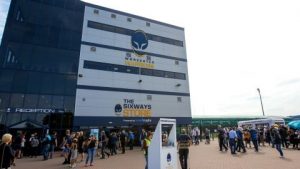Chancellor warns of £60bn of cutbacks in West Midlands speech

GEORGE Osborne used a visit to the West Midlands to warn about the harsh economic realities still facing the country and suggested that more than £60bn still needs to be trimmed from the budget deficit if Britain is to once again start paying its way in the world.
The Chancellor said the current cost of borrowing was unsustainable and that that cutbacks, especially to the welfare budget, would continue to be made well into the new Parliament.
Officially opening the new head office of automotive component manufacturer Sertec in Coleshill, he told an audience of factory workers and journalists that the UK is still borrowing around £100bn a year and was paying half that money a year in interest just to service the debt.
“We’ve got to make more cuts – £17bn this coming year, £20bn next year and over £25bn further across the two years after. That’s more than £60bn in total,” he said.
He claimed the Government’s economic policies were helping to provide a stimulus to the economy and were helping firms like Sertec and others in the automotive supply chain to thrive.
However, he said the task of recovery was “not even half done” and said 2014 would be a year of hard truths and in an early dose of electioneering said it was a time when Britain faced a choice.
“Do we say: the worst is over; back we go to our bad habits of borrowing and spending and living beyond our means – and let the next generation pay the bill,” he said.
“Or do we say to ourselves: yes, because of our plan, things are getting better. But there is still a long way to go – and there are big, underlying problems we have to fix in our economy.
“More repairs. More cuts. More difficult decisions.
“That’s the choice in 2014: to go on working through a plan that is delivering for Britain, putting us back in control of our destiny with the security and peace of mind that brings; or squander what we’ve achieved and go back to economic ruin.
“Ultimately it’s your choice – a choice for the British people.”
He said the Government’s five-point plan for the economy comprised: a reduction in deficit, cuts in taxes, an increase in employment, a reduction in immigration and caps to welfare and a schools/skills initiative to create long-term sustainability.
On welfare spending, he said the Government would not allow a something for nothing benefits system to become a lifestyle choice for the long-term unemployed, funded by hard-working taxpayers and warned tough measures would be introduced.
“Welfare cannot be protected from further substantial cuts,” he said.
“I can tell you today that on the Treasury’s current forecasts, £12bn of further welfare cuts are needed in the first two years of next Parliament.
“That’s how to reduce the deficit without even faster cuts to government departments, or big tax rises on people.”
Referring back to the hard choices, he added: “The truth is there are no easy options here, and if we are to fix our country’s problems, and not leave our debts to our children to pay off, then cutting the welfare bill further is the kind of decision we need to make.”
He pledged support to develop better schools and to sustain the long-term growth of businesses such as Sertec, a skills initiative based around the real needs of industry.
Responding to the Chancellor’s speech, John Cridland, CBI Director-General, said: “We’ve long backed the dual approach of tackling the deficit and boosting growth and it is beginning to reap some positive results, but there is still much more to do.
“As the Chancellor highlights, only by helping businesses to grow will we be able to pay down our national debt while creating jobs and raising living standards.
“The Government still needs to do more to help energy-intensive businesses, improve routes to higher vocational skills and get infrastructure projects off the ground.”








